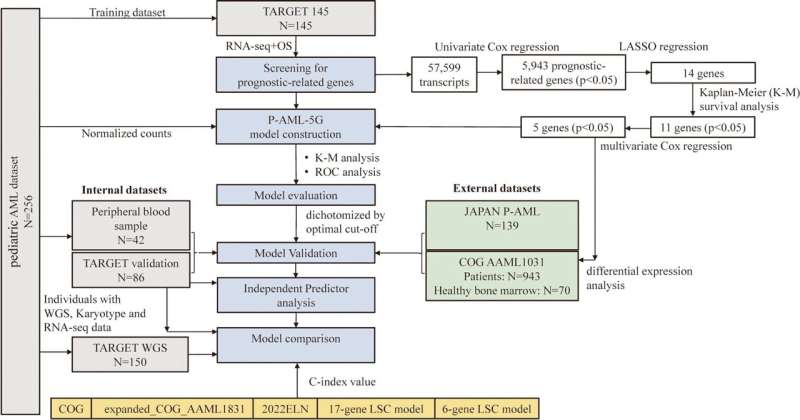This article has been reviewed according to Science X's editorial process and policies. Editors have highlighted the following attributes while ensuring the content's credibility:
fact-checked
proofread
A novel gene-based prognostic tool for personalized treatment in pediatric acute myeloid leukemia

As our understanding of AML biology, cytogenetic and molecular profiles, and the emergence of new treatment options continues to evolve, it becomes imperative to adapt prognostic tools accordingly.
In a study led by Dr. Hua You (Children's Hospital of Chongqing Medical University, Chongqing, China), he and his lab members successfully introduced a five-gene transcriptional signature that operates independently from cytogenetic abnormalities and genetic mutations. This signature holds the potential to pinpoint pediatric AML patients at the point of diagnosis who are likely to experience unfavorable prognoses.
The effectiveness of the model was confirmed through successful validation in an internal validation set, along with two external validation sets. Particularly noteworthy is one of the external validation sets, which involved a Japanese population with a genetic background entirely different from that of the model's training cohort.
In both the training and internal validation cohorts, the risk model maintained its predictive capability in multivariable analysis and enhanced risk prediction within the context of traditional cytomolecular COG classification. This improvement was particularly evident in the subgroup receiving only chemotherapy treatment.
"In order to reach the aforementioned conclusions, we conducted a detailed analysis of several existing AML prognostic models and compared them to our own model. The process of assigning the prognostic groups based on each patient's 2022 ELN risk stratification system and expanded COG AAML1831 risk stratification system was highly labor-intensive due to the involvement of numerous variables."
"This process made us realize the significance of simplifying risk stratification for pediatric AML. We believe that our work is of great importance, and we will continue to delve deeper into this research area," said Dr. You.
The researchers propose a robust P-AML-5G prognostic model tailored for pediatric AML, developed using data specifically from pediatric AML outcomes. This model has the potential to redefine traditional COG risk categorization, accurately identify high-risk patients, and open up possibilities for clinical application in the development of innovative treatment options.
Importantly, it achieves this by streamlining the panel and complexity of genetic markers without compromising its predictive efficacy.
The study is published in the journal Molecular Biomedicine.
More information: Yu Tao et al, Development and validation of a promising 5-gene prognostic model for pediatric acute myeloid leukemia, Molecular Biomedicine (2024). DOI: 10.1186/s43556-023-00162-y



















